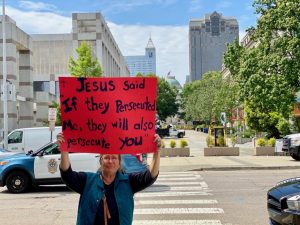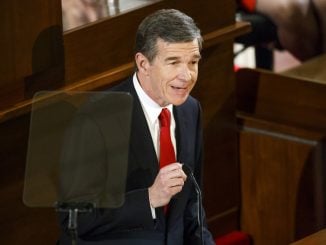RALEIGH — One lawsuit has been filed and another group is threatening to sue over restrictions in Gov. Roy Cooper’s executive orders and “phase one” plan.
In a press conference held today in front of the legislative building, several religious non-profit advocacy groups announced they would be filing suit today against Cooper for restrictions his orders have placed on churches and worship services.

The press conference was organized by Return America, a faith-based advocacy group located in Wallburg, NC. Return America seeks to create “a network of churches and individuals” to promote Judeo-Christian values and to help educate and influence government in those principles.
“We’re not against this man, we’re against his policy,” said Dr. David Gibbs, Jr., founder and president of the Christian Law Association. Gibbs also said, “We have the ability to open our churches safely.”
Several members of the General Assembly were in attendance including Rep. Keith Kidwell (R-Beaufort), Larry Pittman (R-Cabarrus), Rep Mike Speciale (R-Craven), Rep. Steve Jarvis (R-Davidson), Larry Potts (R-Davidson), Jeff McNeely (R-Iredell), Rep. Phil Shepard (R-Onslow), and Jerry Carter (R-Rockingham).
The plaintiffs in the suit are Berean Baptist Church, Return America, Inc., Dr. Ronnie Baity, Pastor of the Church and President of Return America and People’s Baptist Church, Inc.
The suit against Cooper is challenging five of his executive orders, including the most recent order, as “unconstitutional.”
The plaintiffs are asking for the courts to grant a concurrently filed motion for a temporary restraining order and to declare Cooper’s orders unlawful and keep any official or similar from enforcing the order. In addition, the plaintiffs are asking for damages as well as court and legal fees.
The suit says Cooper’s orders “treat religious gatherings less favorably than similar secular gatherings, virtually banning religious assembly, are not narrowly tailored, and do not permit less restrictive means to achieve the government’s interest without burdening Plaintiffs’ rights as guaranteed by U.S. Constitution First Amendment.”
“The Orders are not neutral laws of general applicability because they target Constitutionally protected activity, significantly burdening the Plaintiffs’ right to freedom of religion and assembly, establishing an orthodox form of religious exercise approved by the State, all the while providing broad exemptions for many other gatherings of more than 10 people that are not constitutionally protected,” the suit reads.
A second suit may be filed as early as next week unless Cooper relents and allows hair and beauty salons to open.
A letter sent to the governor on May 13 on behalf of the Hair is Essential Association by the law firm of Kitchen and Turrentine. Cooper has been given a deadline of May 18 at noon to lift his order or the group will move forward with a lawsuit.
“People have the inalienable right to earn a living. Neither you, nor the state, have the right to preclude citizens using their own means from pursuing their own vocation,” the letter reads.
The letter says that the governor overstepped his legal power or authority since his orders were “issued in violation of N.C. General Statute § 166A-19.30(b).”
The cited statutes deal with the additional powers that can be granted to the governor during a state of emergency. Specifically, the statute says that emergency powers are granted to the governor “during a gubernatorially or legislatively declared state of emergency, with the concurrence of the Council of State.”
When Cooper issued his order shutting down restaurants and bars in March, emails provided by Lt. Gov. Dan Forest show that the governor failed to get concurrence from the Council of State. The email time stamp shows the email was sent at 12:41 p.m. and request a response by 1:15 p.m., leaving the Council of State members no chance to debate the issue and only a 30-minute window to respond.
Earlier this week, the Republican majority who sit on the Council of State sent a letter to Cooper asking him to meet with them to discuss the governor’s plans for reopening the state.



